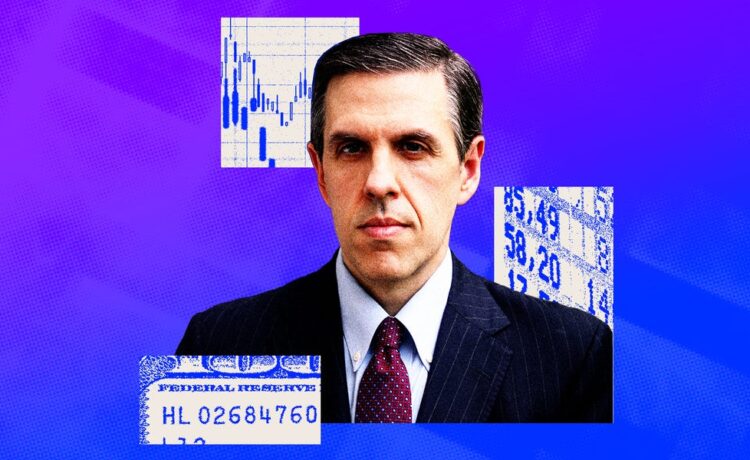- David Giroux has beaten his Morningstar Moderate Allocation peer group average for 17 years.
- The fund manager’s record-breaking streak results from fundamental analysis and active management.
- Giroux is betting on Treasurys and unloved software, healthcare, and utilities stocks.
Top fund manager David Giroux didn’t earn his reputation by following the hottest stocks in the market.
“Being a little contrarian and very, very valuation sensitive,” was Giroux’s answer when Business Insider asked about his investing approach.
By buying unloved areas of the market and not being afraid to let go of success stories once he thinks they’re no longer fairly valued, Giroux has led the T. Rowe Price Capital Appreciation Fund (PRWCX) to beat its Morningstar Moderate Allocation peer group average performance for the last 17 years in a row — a record.
T. Rowe Price compared Giroux’s Capital Appreciation Fund to more than 3,000 US-domiciled funds in the Morningstar database going back to 1925 and found that no other fund has had a longer streak under the same portfolio manager. Morningstar independently verified the record.
An investor who initially invested $100,000 in the Capital Appreciation Fund in 2008 would have seen their investment grow to $490,000 by the end of 2024. By comparison, the average return from the Morningstar US Fund Moderate Allocation category would have resulted in $253,000. That’s 94% more than the category average.
“We don’t own the market. We own four or five dozen stocks that we think are really, really attractive,” Giroux, who is also the chief investment officer for T. Rowe Price Investment Management, said.
“We owned Costco not too long ago when it traded for 35 times earnings, and now we don’t,” he added. The wholesale retailer now trades at over 50 times earnings, a price that Giroux deems overvalued.
As stock-market valuations and investor optimism remain relatively high, Giroux sees an opportunity to find hidden pockets of value.
“People are chasing stocks without regard to valuation, which is probably also a sign that there’s a little bit of speculative success in the marketplace,” he said.
Below, Giroux shares two trades that he’s betting on to steer his fund in the direction of another year of outperformance.
Double down on fixed income
With the stock market having performed so well over the past two years, it may be tempting to bet on a third year of stellar returns. However, Giroux cautions against using the past to predict what’s next.
“The future is far more uncertain than we think it is, so if you’re putting a high value on stocks because you think the future is going to be great, it usually does not work out that way,” he said
That said, Giroux is pulling back his equity allocation and adding more fixed income.
“We have the ability as a multi-asset strategy to adjust our equity weight and our fixed-income rate,” he said. Giroux tends to hover in the ballpark of a 60/40 stock-to-bond portfolio. However, “we’re actually 300 to 400 basis points below what we think is normal equity exposure for us,” he said.
Giroux has increased the fund’s exposure to Treasurys instead, citing their safety and liquidity. Treasurys also tend to rally in times of market volatility, making them an ideal candidate for portfolio protection. The yield on the US 10-year, which is up almost a full percentage point since September to 4.5%, also remains at one of its highest levels in the last 25 years. The fund currently has around a 15% allocation to five- and 10-year Treasurys.
Invest in underloved areas of the stock market
Although the market is expensive, Giroux sees overlooked pockets of opportunity if you look outside the big names, like Nvidia.
“I don’t think the outlook for Nvidia over the next three to five years is nearly as good as it has actually been in the last couple of years,” Giroux said.
He expects increased competition in the chipmaking space could shrink Nvidia’s market share. That’s not to mention the recent tech selloff — including for Nvidia — in the wake of Chinese OpenAI competitor DeepSeek‘s debut.
Giroux also isn’t enthusiastic about financials, a sector of the market that Wall Street is betting will benefit greatly from President Donald Trump‘s deregulatory policies.
“When banks trade for 14- or 15-times earnings, that’s kind of scary,” Giroux said. The sector has historically traded at a more muted 10- to 12-times earnings.
Instead, Giroux is turning toward undervalued areas of the market like software, healthcare, and utilities.
Software, in particular, has been overlooked by investors for more flashy names in the tech space, according to Giroux, making valuations cheap. He sees many names in the space with the potential to grow revenues at a rate of 10% or higher, especially if they begin utilizing AI.
One of Giroux’s top software picks is the human capital management company Workday (WDAY). He believes the company will achieve mid-teens revenue growth in the next few years.
“This is a best-in-class software business with 98% gross retention, a market leader in their space, a lot of margin expansion in front of us, trading at the lowest valuation it’s ever traded for in the past,” Giroux said.
Investors can get exposure to these areas of the market through funds like the iShares Expanded Tech-Software Sector ETF (IGV), the Health Care Select Sector SPDR Fund (XLV), and the Vanguard Utilities ETF (VPU).

